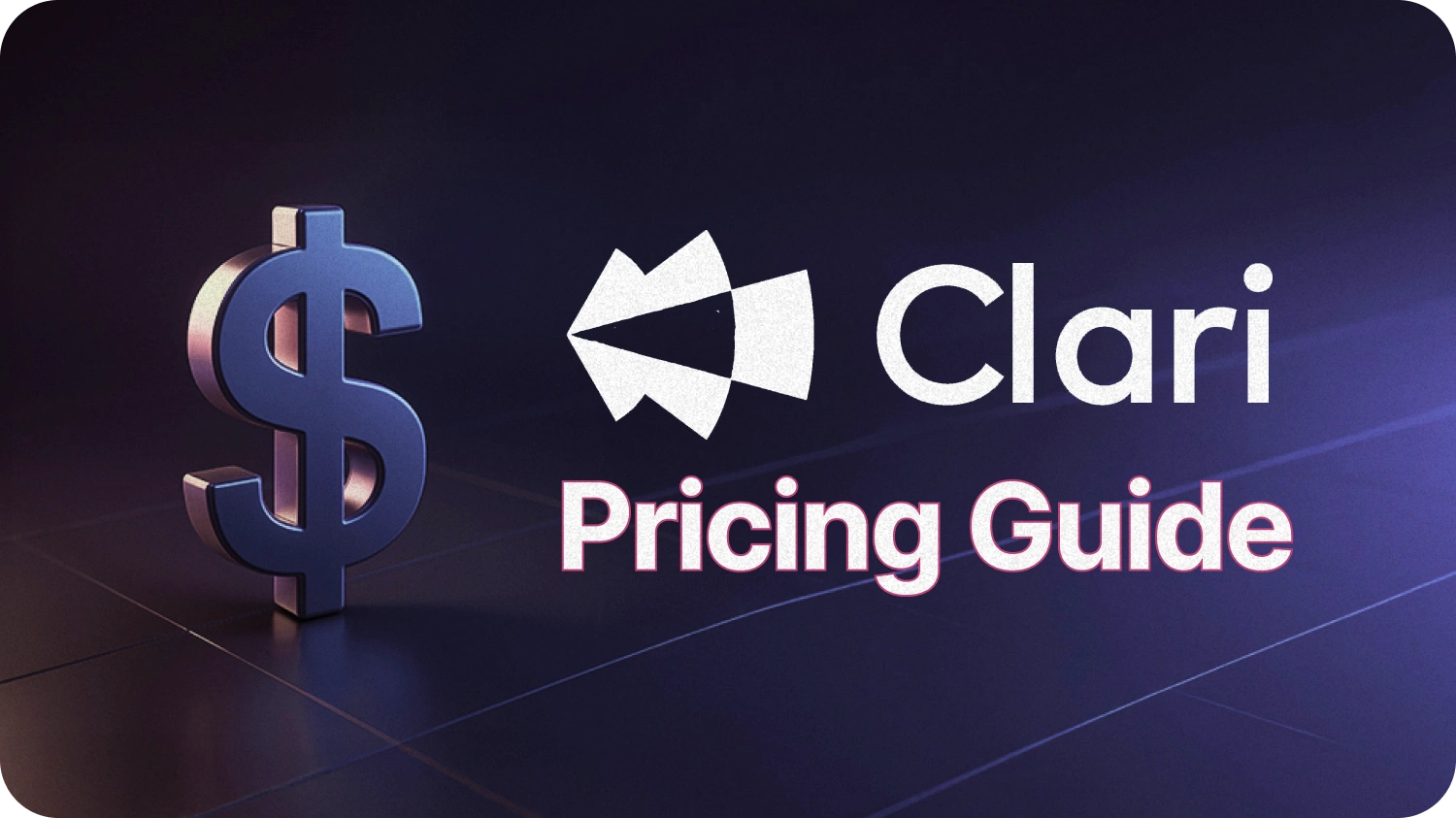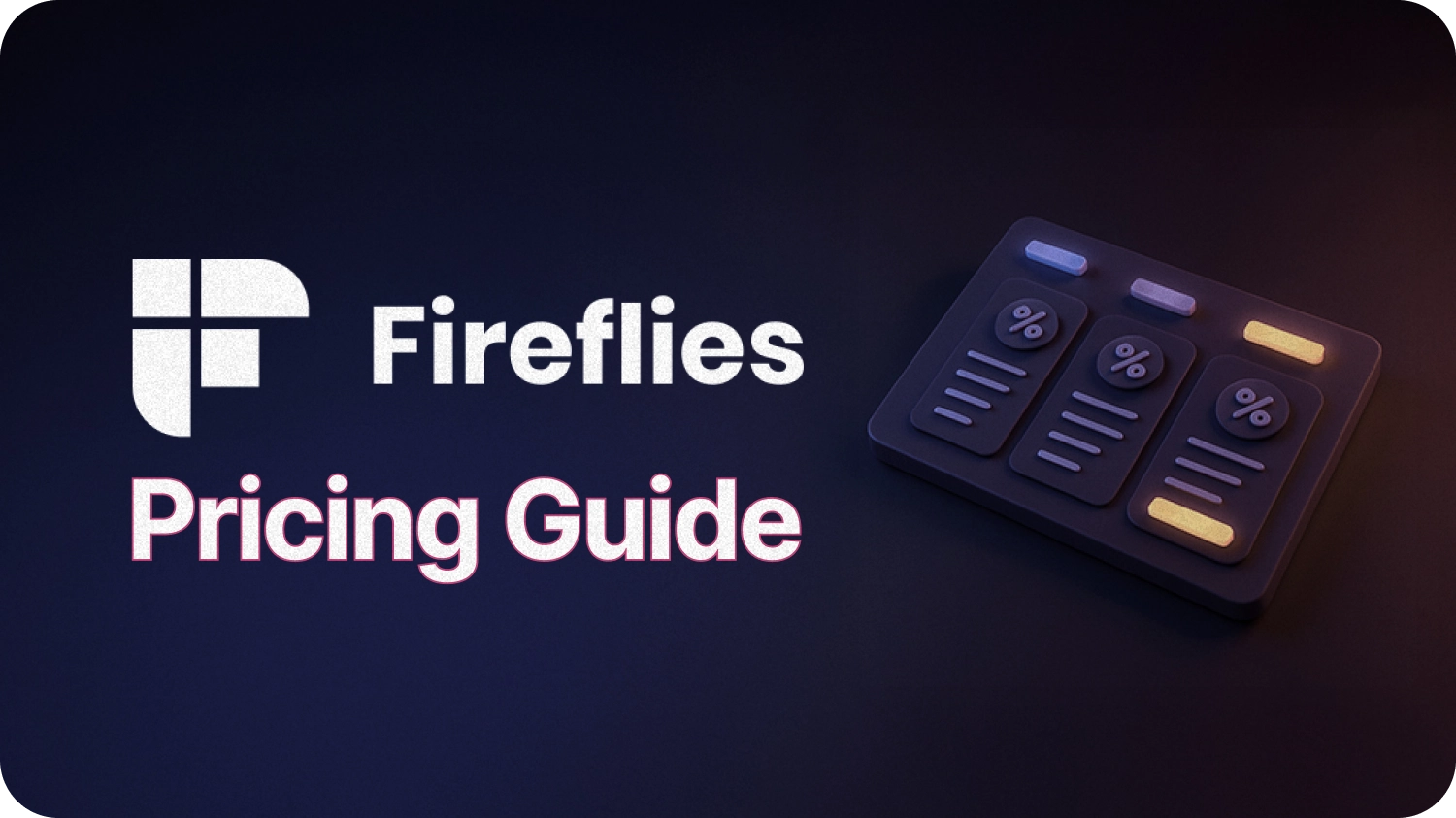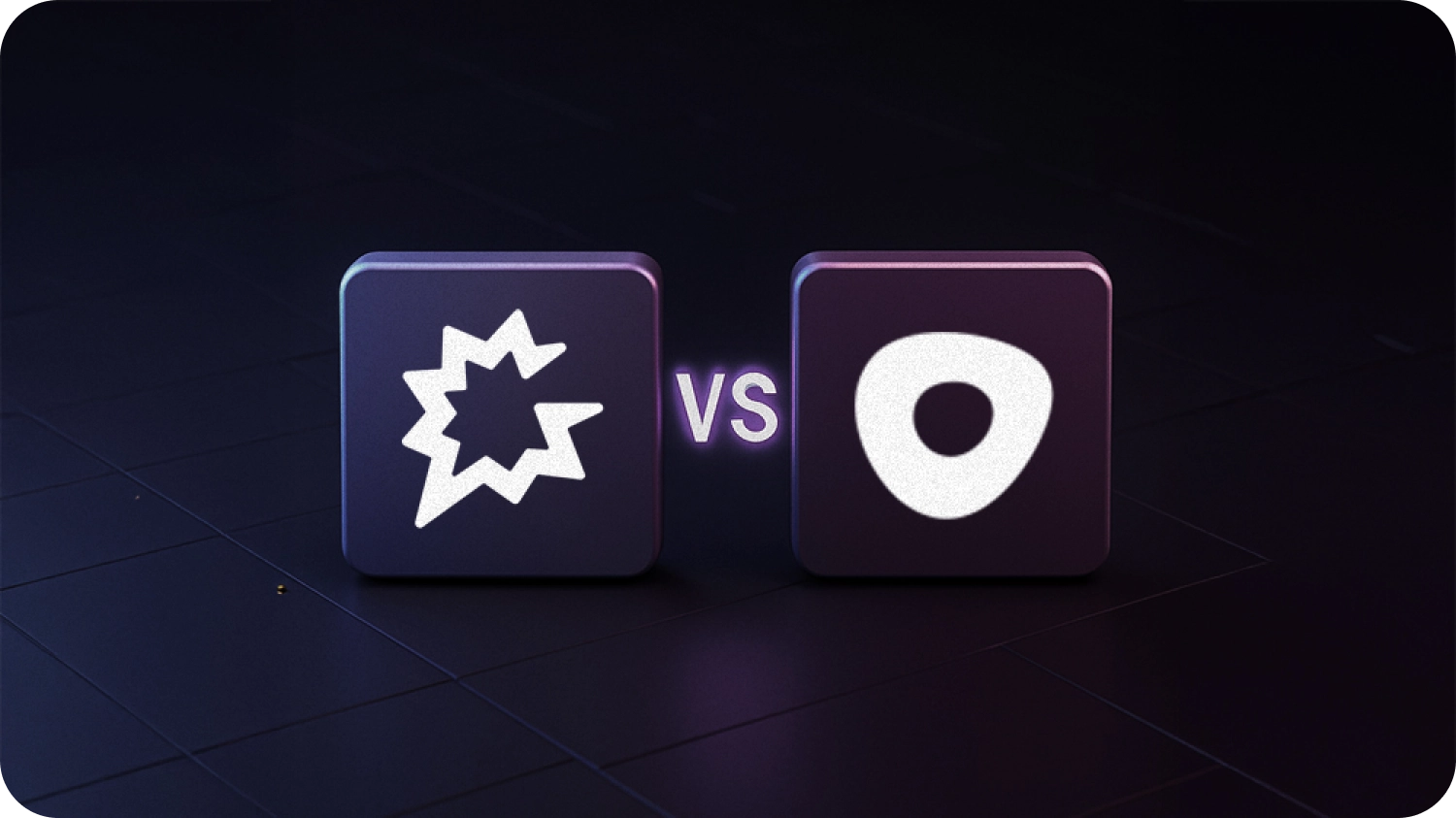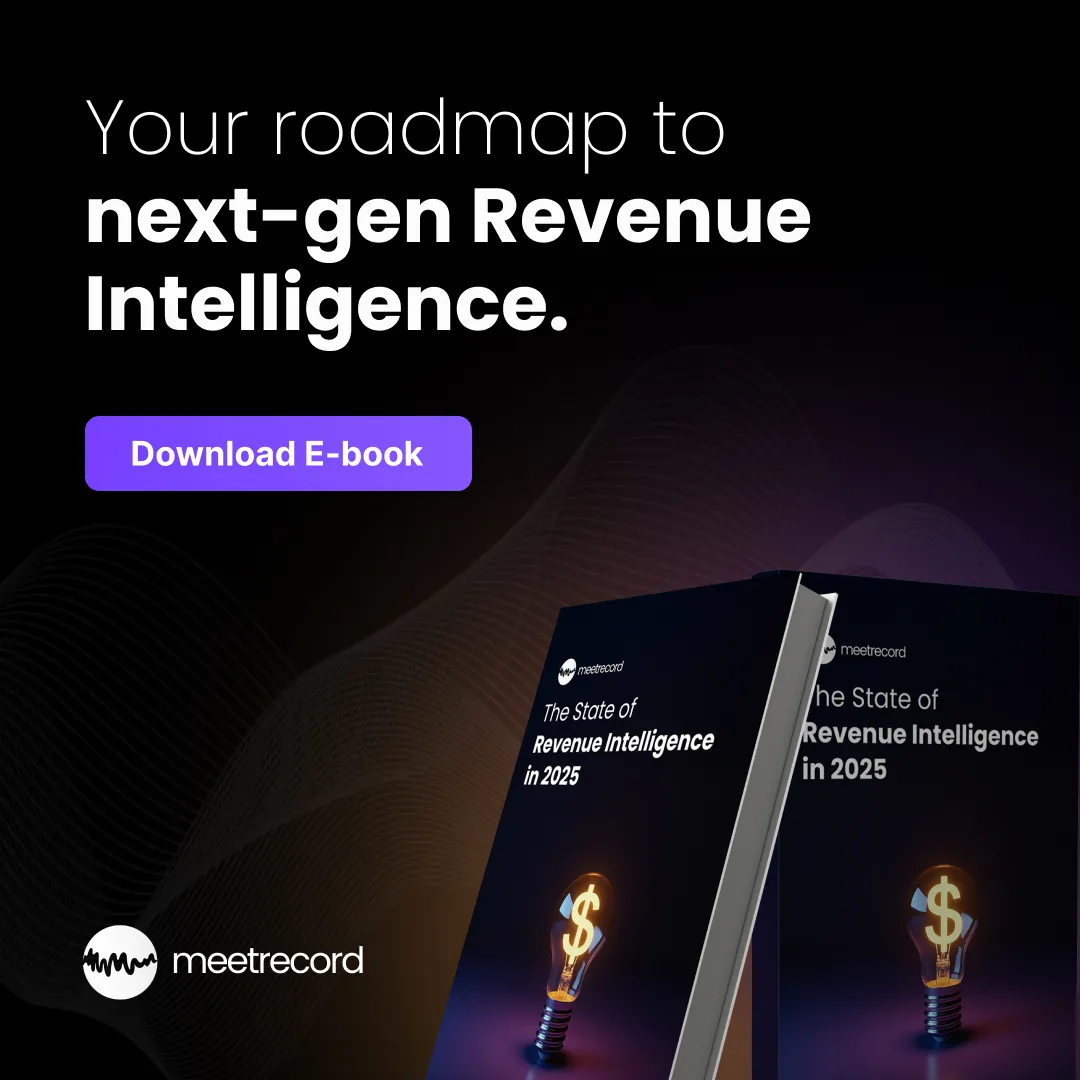Only 13% of customers believe a salesperson can understand their needs. What if every sales rep on your team was better prepared for every meeting and spoke the customer's language?
You know how powerful that can be.
And that’s probably why you’re looking for a conversation intelligence tool for your sales team.
We’re here to help you compare Chorus and Jiminny, two popular tools in this category. While Chorus is a big player in the market, giving close competition to Gong, Jiminny has fast emerged as a name to reckon with.
In this Chorus vs Jiminny comparison, we analyze their features, positioning, pricing, and user reviews.
Chorus vs Jiminny: 3 focus areas for an effective comparison
As you can see above, Chorus and Jiminny are broadly similar when it comes to overall features.
It’s when it comes to the actual usage scenarios and pricing that the differences show.
Here are a few guiding questions to ask yourself when you evaluate Chorus and Jiminny in the rest of this article.
1. Use cases and core functionalities
Which are your top use cases? Do you need it for conversation visibility and conversation intelligence for sales? Is it sales coaching from a manager’s perspective? Do you need revenue intelligence that extends to forecasting and pipeline alerts?
2. Your company size and structure
Are you looking for an enterprise solution? Do you need Chorus or Jiminny only for your sales team? Will all your users be active/recording users? Is your team size and structure fixed? What flexibility in payment do you need?
3. Adoption and usage support
Do you have/need someone to manage, administer, and train users on a new platform? Do you need support with onboarding? Do you need a dedicated CSM or support manager?
With these questions in mind, let’s evaluate Chorus and Jiminny’s features and pricing in detail.
Chorus vs Jiminny: Feature, Functionality, and Pricing Comparison
Let’s start with a quick look at how Jiminny and Chorus compare when it comes to conversation intelligence, sales coaching, meeting efficiency/management, revenue intelligence, and team collaboration.
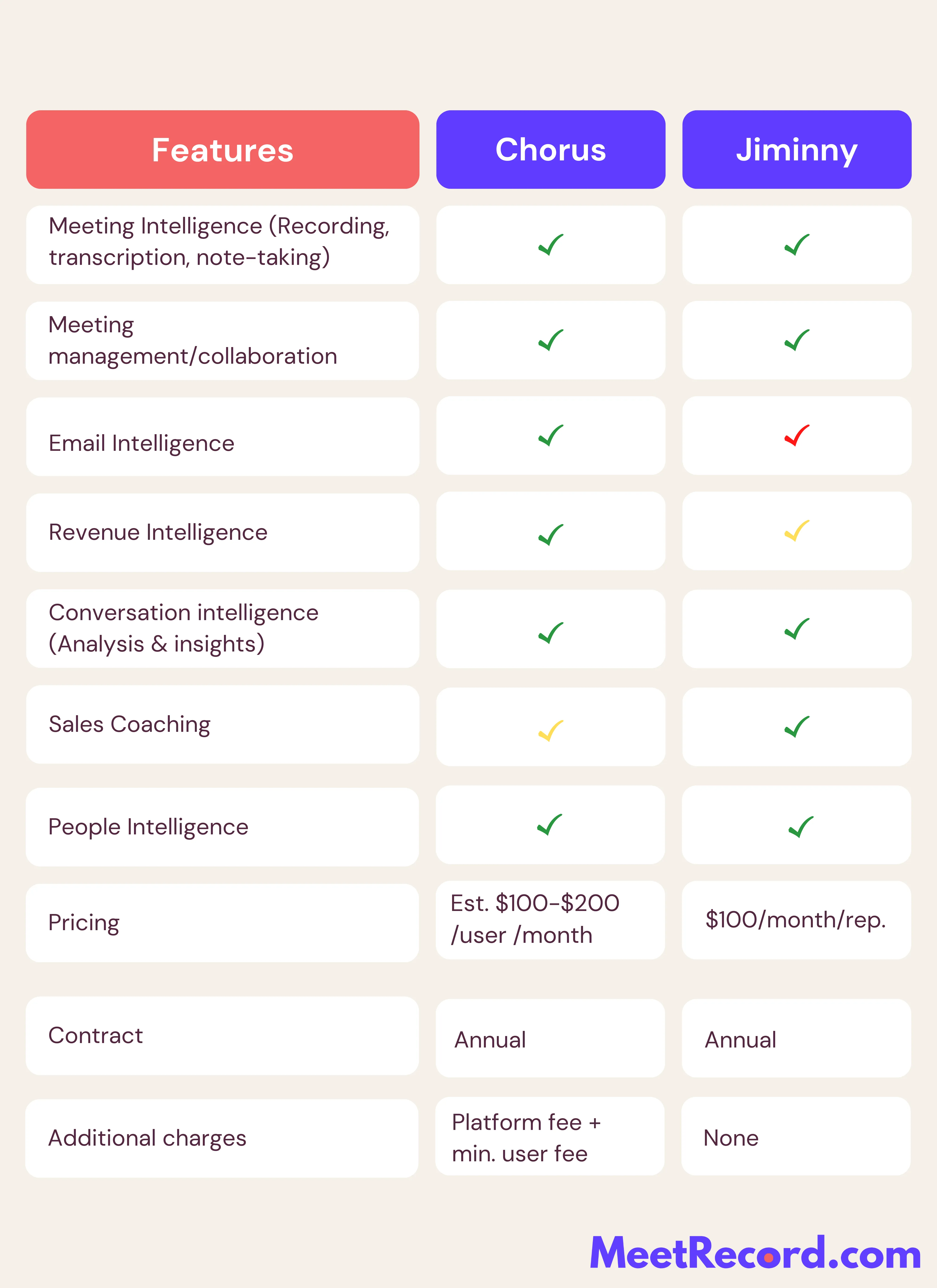
1. Meeting Intelligence (recording, transcription, note-taking) and Meeting management
Both Chorus and Jiminny offer call recording functionalities with most conferencing tools and offer AI-powered transcripts and notes from conversation analysis.
They also come with integrations for other important tools such as popular CRMs and communication tools such as Slack to ensure you get maximum value from meeting notes and recordings.
2. Email Intelligence
Both Chorus and Jiminny centralize and analyze key conversations across emails in addition to calls.
3. Revenue Intelligence
If you’re a large organization, Chorus may be more appealing with its activity threshold tracking, multi-threading across channels, and other revenue intelligence capabilities.
Its DealHub gives you the complete context of calls and conversations from a maturity and risk standpoint – and can help with advanced pipeline management and forecasting.
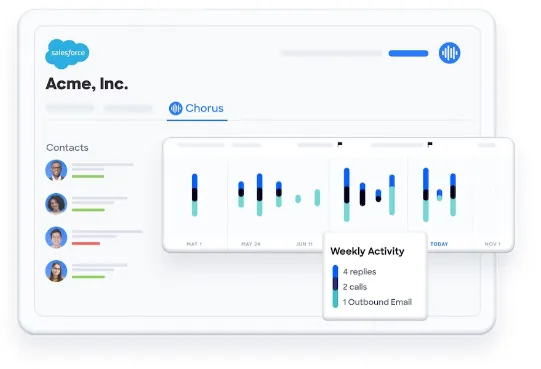
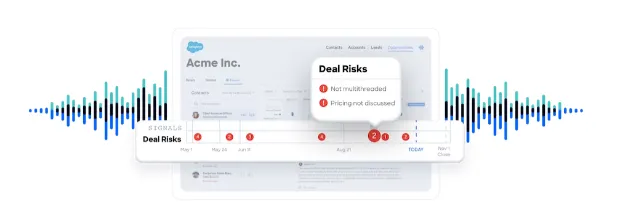
It offers alerts, deal recommendations, and rep improvement opportunities based on a risk analysis of the deal pipeline across channels.
Jiminny offers easy pipeline visibility, but currently, doesn’t have a strong focus on deal management or forecasting capabilities. However, if you’re a small business or young sales team, Jiminny’s revenue intelligence is all you need to view, track, and manage all your deal across sales reps and channels.
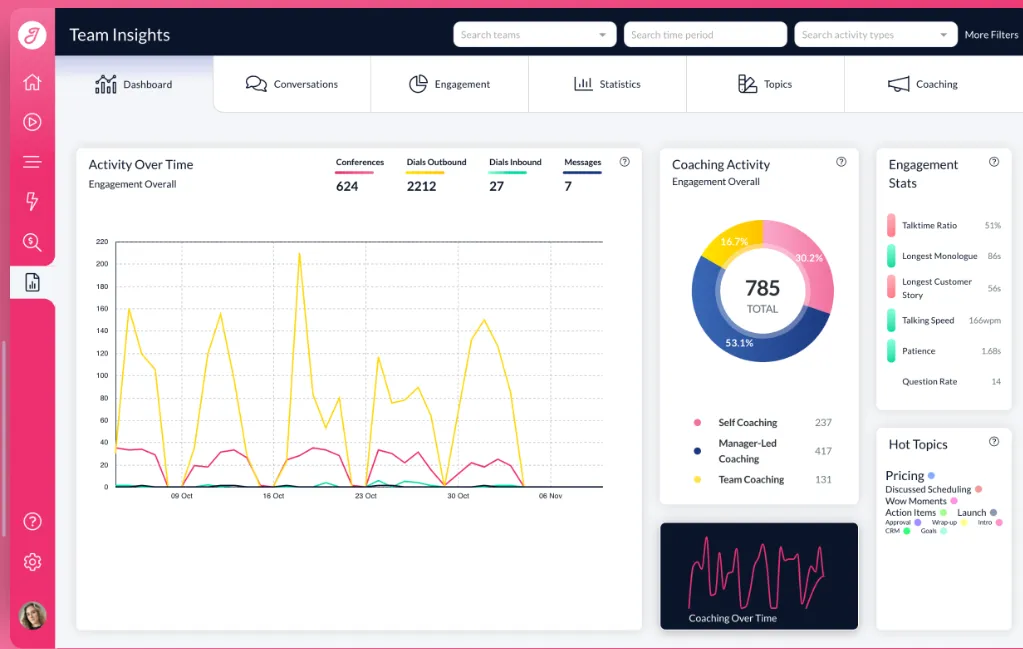
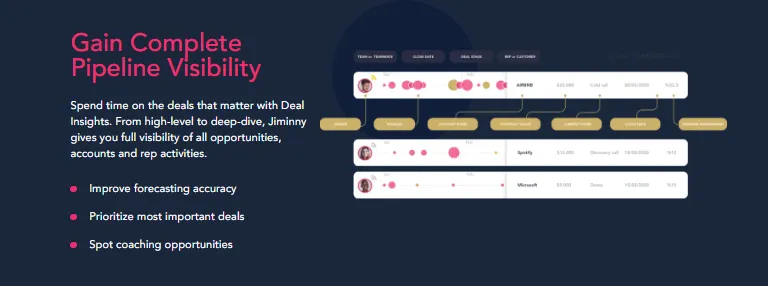
4. Conversation Intelligence and People Intelligence
When we talk about the application of conversation intelligence, we’re looking at the ability to learn from, and analyze, conversations to extract
- Market intelligence (competitor mentions, key objections, feature requests, etc.)
- People intelligence (studying and tracking the performance of individuals in customer-facing conversations by tracking engagement, listening, interactivity, etc)
Jiminny and Chorus offer competitive conversation intelligence capabilities, making them ideal for customer-facing teams.
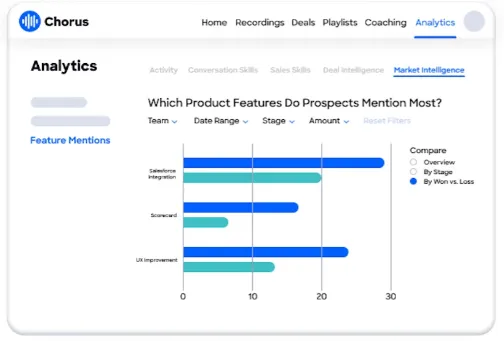
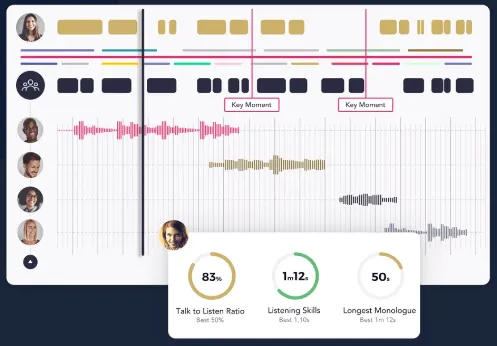
5. Sales Coaching
Both Chorus and Jiminny’s people intelligence and conversation intelligence ensure that managers and sales reps have the data/insights, context, and targeted recommendations they need for self-led and manager-led coaching.
Chorus has a Smart Playlists feature that lets you create coaching playlists based on criteria you've chosen (deal stage, keyword mentions, etc).
Jiminny has a designated CSM who works with you to help implement your coaching program.
If you’re looking for more guidance and support in implementing your sales coaching program, we recommend Jiminny – especially if you’re a small organization or early-stage team that could benefit from learnings from other similar companies.
6. Onboarding, Adoption, and Ease of Use
When you look at customer ratings, G2 user ratings show that Jiminny ranks almost 10 places higher than Chorus.


Chorus is mostly designed for and used by enterprise teams that often have dedicated personnel or training capabilities to assist with new tools.
Jiminny caters to a wider set of users and that explains a more user-friendly design.
7. Jiminny vs Chorus: Pricing Comparison
Chorus’s pricing approach needs you to go through a sales call and further qualification/negotiation conversations to know the pricing that applies to you.
However, estimates show that you could be paying $100 to $200 per user per month with a compulsory base price, working out to $1400 per user per year.
Jiminny has a transparent approach with a standard per-user price of $85/month for annual billing. It does not charge a platform fee – though it has a setup fee for onboarding.
Jiminny’s flat pricing also means that you end up paying the same fee per user whether you conduct a handful of meetings, or have a large number of meetings.
However, Jiminny also offers free user licenses for users who don’t need to record calls but just want to just listen to calls (Marketing team, Product team, etc).
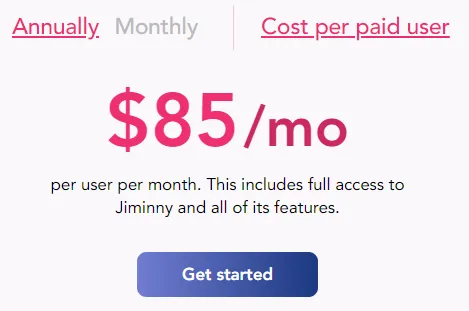
8. Chorus vs Jiminny: Target audience
To understand this, let’s take a look at their respective customer profiles to see the clients they’re looking to best serve.
Chorus’s customer base compromises mostly enterprise companies and their messaging/positioning clearly reflects that.


Jiminny on the other hand, currently, counts mostly SMBs and mid-market organizations as its customers.
9. Jiminny vs Chorus: Customer Reviews
On G2, Chorus is rated 4.5/5 stars with 2,807 reviews, and Jiminny scores 4.7/5 with 277 reviews.
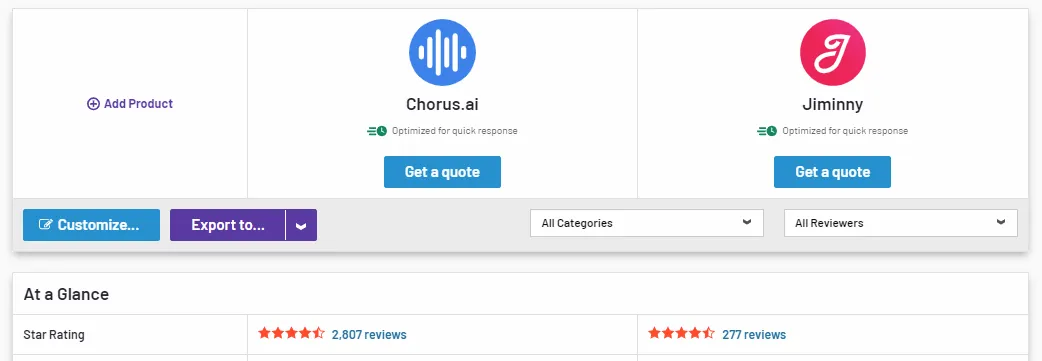

Jiminny rates higher than Chorus when it comes to user ratings – though this needs to be seen in the context of the number of reviews.
Conclusion
We hope this comparison helps you decide between Jiminny and Chorus for your conversation intelligence and sales coaching needs.
If you’re looking for the closest Gong competitor for your enterprise team needs, Chorus is your best bet. It’s a trusted name in the business, has a solid product offering, and is used by some of the biggest companies in the world.
Jiminny, a relatively smaller player, is still a very competitive offering with the best of Chorus’s features designed for mid-market companies. It offers a free trial so you can see it in action in your context. There are a couple of minor practical or payment-related drawbacks to consider if you’re a small business or early-stage company – namely
- Flat pricing (you pay a flat fee whether you conduct 10 or 100 meetings)
- Setup fee
If you’re looking for conversation intelligence and sales coaching with advanced AI capabilities and 2.2x ROI, do check out MeetRecord.
Like Jiminny, it provides most of Chorus's conversation intelligence features so you can
- Identify revenue and customer insights from customer-facing conversations
- Get visibility into every sales conversation and every sales rep’s performance
- Implement manager-led, peer-led, and self-learning sales coaching programs with actual call recordings and personal insights
Further, it has advanced AI features that help you with deal acceleration and sales coaching
- Automated AI Coaching - Save hours reviewing calls with instant scores and personalized scorecards
- Adaptive Deal Intelligence with realtime forecasting
- AI Sales Role Plays & Mock Calls - Practice mock calls before you do an actual call
Talk to us to make conversation intelligence and sales coaching work for you – with the lowest investment and maximum flexibility.


.svg)

.webp)

